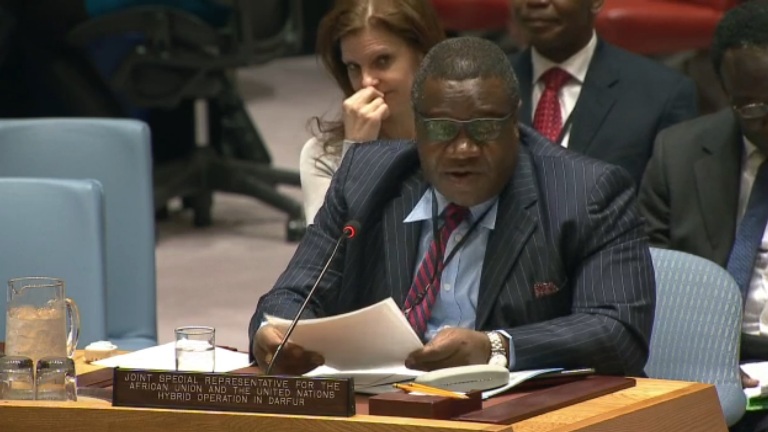Sudan FVP, UNMAID chief discuss opening of new base in Jebel Marra

August 30, 2017 (KHARTOUM) – The head of Darfur hybrid mission (UNAMID) Jeremiah Mamabolo and the Sudanese Frist Vice President Bakri Hassan Salih Wednesday discussed the opening of a new base in Golo area, Jebel Marra in Central Darfur state.
The Security Council last June asked the Secretary General to report on the Sudanese government “flexibility to open and close UNAMlD operating bases as necessary, including the establishment of a temporary operating base in Golo”.
In press statements to the official media, (SUNA and Sudan TV) in Khartoum following his meeting with Salih, Mamabolo said the meeting was part of the continued consultation with the Sudanese authorities on how to implement the Mission’s mandate and described the meeting as successful.
He pointed out that the UN Security Council resolution 2363 of last June has changed the nature of the UNAMID’s task, saying they are currently focusing on peace building in the safe areas.
Mamabolo stressed the need for further cooperation between the Mission and the Sudanese government on all levels to enable the former carry out its new tasks.
The UNAMID’s chief disclosed his mission has so far closed 4 team sites out of the 11 sites which are supposed to be shut down in the first phase, adding he proposed to Salih “to move the Mission’s headquarters to Golo area,” according to SUNA.
Sudan Tribune sought in vain to reach the hybrid mission to confirm the exactitude of the statements which were translated into Arabic from English.
Last June, the African Union and the United Nations decided to draw down the UNAMID by withdrawing the military personnel by 44% and that of the police component by 30%, the closure of 11 team sites in the first phase and the withdrawal of the military component from another 7 team sites in the second phase.
The UNSC admitted that the security situation in Darfur has improved but it decided to reinforce its presence in the mountainous area of Jebel Marra because there is no cessation of hostilities as a Sudan Liberation Movement faction led by Abdel Wahid al-Nur (SLM-AW) refuses to declare a unilateral truce or to engage in peace negotiations.
During a visit to Central Darfur state in July, the head of U.N. peacekeeping operations John Pierre Lacroix called to authorise the opening of a UNAMID base in Golo area.
Also, last month the U.S. embassy in Khartoum called on the warring parties in Darfur to commit themselves to a cessation of hostilities and urged the government to authorise a UNAMID base in the mountainous area.
At the time, the Central Darfur Deputy Governor, Mudathir Adam Omer, expressed the readiness of his government to fully cooperate with the hybrid peacekeeping mission.
He added that the decision on the Mission’s base in Golo would be made after consulting the joint committee between the government and the United Nations, which is authorised to decide on the redeployment of peacekeepers in Darfur provided in the resolution of the UN Security Council.
However, the ruling National Congress Party rejected the proposal, saying “the Jebel Marra area of Golo does not need new UN forces. Darfur has become safe and stable thanks to the efforts made by the competent authorities to protect civilians in Darfur”.
Golo area, which is located in the mountainous area of Jebel Marra, is at 56 km. east of Central Darfur state capital; Zalingei. It was the first area attacked by the rebels in February 2003.
The Sudanese army has been fighting a group of armed movements in Darfur since 2003. UN agencies estimate that over 300,000 people were killed in the conflict, and over 2.5 million were displaced.
The hybrid mission has been deployed in Darfur since December 2007 with a mandate to stem violence against civilians in the western Sudan’s region.
It is the world’s second largest international peacekeeping force with an annual budget of $1.35 billion and almost 20,000 troops.
Recently, the United States which pays over 28% of the $7.8 billion peacekeeping budget, announced that it would cut nearly $1.3 billion of its contribution from October 2017 and urged the United Nations to take it into account.
(ST)
